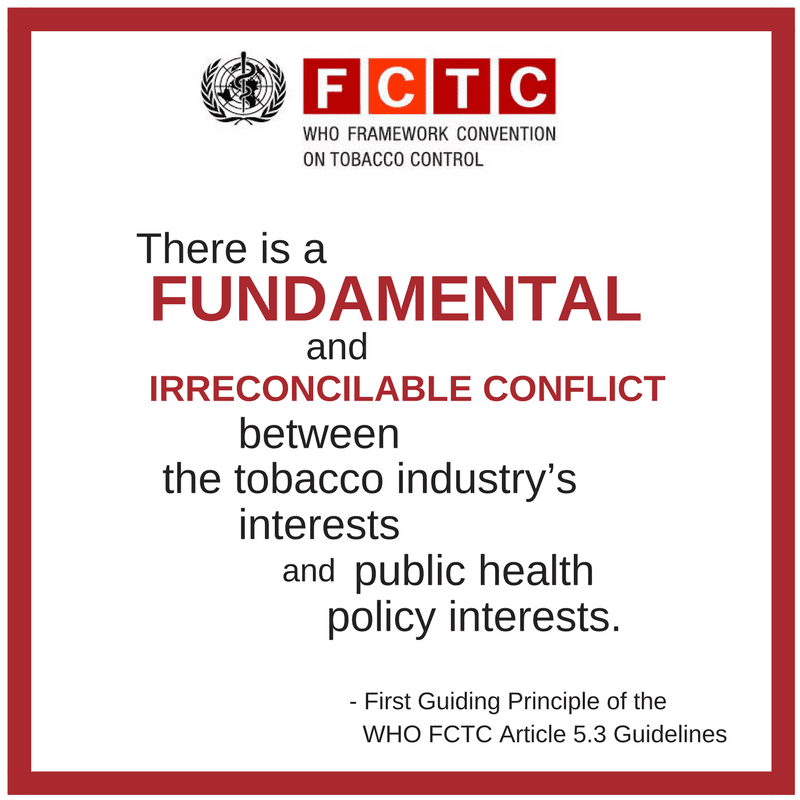On September 13, a new chapter in the struggle against tobacco began with a surprise announcement. Philip Morris International, a multinational giant and marketer of Marlboro, the world’s most popular cigarette brand, has committed itself to fund a new entity, the Foundation for a Smoke-Free World, with just shy of a billion US dollars over 12 years. The purported aim of PMI’s foundation is to eliminate smoking.
ASH and the broader public health community can take a moment here to recognize a victory of sorts. For decades the tobacco industry based its defense on a known fallacy – that there is not enough scientific proof that tobacco is harmful or addictive. Diligent research and advocacy have rendered that position untenable, and PMI has been forced to retreat to a new defensive line. But their new strategy is dependent on naive global acceptance that PMI is changing its ways. We know better. 
ASH supports the statements of the WHO and the FCTC Secretariat. Both organizations stand squarely in favor of public health and against tobacco industry interference. Both joined others in citing Article 5.3 of the Framework Convention on Tobacco Control as one of the bases of their response. This is valid – 5.3 is more than a legal obligation for FCTC Parties to limit opportunities for the tobacco industry to undermine public health. It colors our global understanding of the relationship between public health and the tobacco industry across borders, across disciplines and across organizations. But as the WHO pointed out, there is a deeper principle at stake, a principle that is the foundation of Article 5.3 and the first Guiding Principle of the Article 5.3 Guidelines: There is a fundamental and irreconcilable conflict between the tobacco industry’s interests and public health policy interests.
PMI would have the public health community believe that this time we are all on the same side, the side that wants to see combustible tobacco disappear. It is simple to demonstrate the fallacy, hypocrisy, and cynicism of this assertion. PMI’s own internal reports, statements to shareholders, and above all actions, highlight conclusively that the company still seeks, by all possible paths, to increase the number of traditional smokers globally. PMI’s CEO has recently made it publicly clear that he finds the idea of ever voluntarily stopping the marketing and sales of cigarettes ludicrous.
We need not address the relative merits of non-combustible nicotine products for our purposes here. To do so implies that our reaction as a public health community to PMI’s foundation hinges on how its money is spent. There is a spectrum of opinions on alternative nicotine products within and among our allies, and persons of good will and intelligence can and do disagree. This is a natural part of scientific advancement and policy development. But the discussion on this important topic should not be left to the tobacco industry.
The tobacco epidemic will never be ended by its perpetrators. It is up to governments, with the advice and aid of the public health community, to protect future generations from the death and disease caused by tobacco use. We already know how to do this. The FCTC is a roadmap to a tobacco-free future. It must be comprehensively embraced and implemented, and countries that have done so have seen dramatic drops in prevalence. One of the prominent features of the roadmap is to protect health from the vested interests of the tobacco industry by denying them a voice in decision making.
PMI’s goal has always been to maximize profits. It is naively wishful thinking that this will ever change. We must proceed cognizant that PMI’s foundation aims to further that profit goal. Remembering the principle of the irreconcilable conflict to which we in public health adhere, and remembering the long history of tobacco industry lies, fraud and manipulation, it would be folly to take any action other than to condemn PMI’s foundational scheme, and ASH urges colleagues across the globe to reject collaborating with it.



